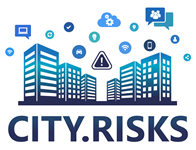City.Risks
City.Risks places information sharing at the center of addressing security challenges in large urban environments and reducing the fear of crime of the citizens.
City.Risks places information sharing at the center of addressing security challenges in large urban environments and reducing the fear of crime of the citizens.

Type of action: Research and Innovation Action
Funded by: Horizon 2020
As the portion of the world’s population living in cities increases, so increases the need for effective and sustainable interventions to improve the quality of life in large urban environments. This involves various domains, such as green transport or efficient energy use that can improve citizens’ health, foster economic development, or address other societal challenges. Among these, a key aspect is the security of the inhabitants. Apparently, the goal and efforts for lowering crime levels are diachronic, e.g. constantly aiming at increasing the capacity of law enforcement agencies (LEAs) with better training and more advanced equipment and technologies. Interestingly, studies have shown that although crime levels affect of course the overall fear of crime and the perception of security of the citizens, they are not the only contributing factor; instead, the perception of security has a broader scope, involving the way inhabitants perceive their surroundings, as well as their sense of belonging in a community. In this context, City.Risks places information sharing at the center of addressing security challenges in large urban environments and reducing the fear of crime of the citizens. This involves answering the questions of what type of information is needed, and with whom, when and how it is shared. Nowadays, citizens are able to participate in many expressions of social life in a city by using social – networks and ICT infrastructures of the urban areas. This has led to an emerging trend, referred to as participatory urbanism. However, although this participation spans a wide set of human activities in the urban landscape, it has not yet been sufficiently investigated and exploited for better addressing security challenges and augmenting the sense of security of the citizens.
 https://www.synyo.com/wp-content/uploads/2016/09/CityRisks-004.png
423
900
SYNYO
https://www.synyo.com/wp-content/uploads/2017/09/synyo-logo.png
SYNYO2016-08-28 12:47:482016-12-20 13:39:19CityRisks - How it works
https://www.synyo.com/wp-content/uploads/2016/09/CityRisks-004.png
423
900
SYNYO
https://www.synyo.com/wp-content/uploads/2017/09/synyo-logo.png
SYNYO2016-08-28 12:47:482016-12-20 13:39:19CityRisks - How it works https://www.synyo.com/wp-content/uploads/2016/09/CityRisks-03.png
423
900
SYNYO
https://www.synyo.com/wp-content/uploads/2017/09/synyo-logo.png
SYNYO2016-04-09 12:30:402016-12-20 13:41:19Area and crime profiles
https://www.synyo.com/wp-content/uploads/2016/09/CityRisks-03.png
423
900
SYNYO
https://www.synyo.com/wp-content/uploads/2017/09/synyo-logo.png
SYNYO2016-04-09 12:30:402016-12-20 13:41:19Area and crime profiles https://www.synyo.com/wp-content/uploads/2016/09/CityRisks-02.png
423
900
SYNYO
https://www.synyo.com/wp-content/uploads/2017/09/synyo-logo.png
SYNYO2016-01-11 12:14:312018-02-19 09:47:50The Citizens Survey
https://www.synyo.com/wp-content/uploads/2016/09/CityRisks-02.png
423
900
SYNYO
https://www.synyo.com/wp-content/uploads/2017/09/synyo-logo.png
SYNYO2016-01-11 12:14:312018-02-19 09:47:50The Citizens Survey https://www.synyo.com/wp-content/uploads/2016/09/CityRisks-001.png
423
900
SYNYO
https://www.synyo.com/wp-content/uploads/2017/09/synyo-logo.png
SYNYO2015-09-26 13:36:312016-12-20 13:41:39Avoiding and mitigating safety risks in urban environments
https://www.synyo.com/wp-content/uploads/2016/09/CityRisks-001.png
423
900
SYNYO
https://www.synyo.com/wp-content/uploads/2017/09/synyo-logo.png
SYNYO2015-09-26 13:36:312016-12-20 13:41:39Avoiding and mitigating safety risks in urban environments https://www.synyo.com/wp-content/uploads/2015/10/news-cityrisks-1.jpg
423
900
SYNYO
https://www.synyo.com/wp-content/uploads/2017/09/synyo-logo.png
SYNYO2015-05-20 17:34:282017-06-14 07:28:24How will City.Risks approach the mitigation of urban threats?
https://www.synyo.com/wp-content/uploads/2015/10/news-cityrisks-1.jpg
423
900
SYNYO
https://www.synyo.com/wp-content/uploads/2017/09/synyo-logo.png
SYNYO2015-05-20 17:34:282017-06-14 07:28:24How will City.Risks approach the mitigation of urban threats?
 FutureTDM
FutureTDM | Cookie | Duration | Description |
|---|---|---|
| cookielawinfo-checkbox-analytics | 11 months | This cookie is set by GDPR Cookie Consent plugin. The cookie is used to store the user consent for the cookies in the category "Analytics". |
| cookielawinfo-checkbox-functional | 11 months | The cookie is set by GDPR cookie consent to record the user consent for the cookies in the category "Functional". |
| cookielawinfo-checkbox-necessary | 11 months | This cookie is set by GDPR Cookie Consent plugin. The cookies is used to store the user consent for the cookies in the category "Necessary". |
| cookielawinfo-checkbox-others | 11 months | This cookie is set by GDPR Cookie Consent plugin. The cookie is used to store the user consent for the cookies in the category "Other. |
| cookielawinfo-checkbox-performance | 11 months | This cookie is set by GDPR Cookie Consent plugin. The cookie is used to store the user consent for the cookies in the category "Performance". |
| viewed_cookie_policy | 11 months | The cookie is set by the GDPR Cookie Consent plugin and is used to store whether or not user has consented to the use of cookies. It does not store any personal data. |

IoThreats
/0 Comments/in IoThreats, Projects /by SYNYOIoThreats addresses the increasing vulnerability of a variety of systems in the fields of the Internet of Things (IoT), such as Smart Grid, Connected Car, Industry 4.0, Active and Assisted Living (AAL), Telemedicine and others.
Protective
/0 Comments/in Projects, Protective /by SYNYOProactive Risk Management through Improved Cyber Situational Awareness
SciChallenge
/0 Comments/in Projects, SciChallenge /by SYNYONext Generation Science Challenges Using Digital and Social Media to Make Science Education and Careers Attractive for Young People